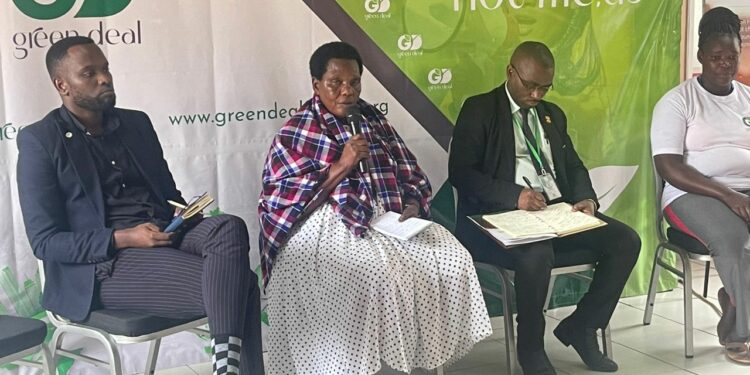In a recent joint report, Resource Rights Africa (RRA) and Green Deal have documented pressing concerns about mining activities in Karamoja, calling for urgent government intervention to safeguard the rights of local communities impacted by large-scale mineral extraction.
Andrew Byaruhanga, Executive Director of RRA, highlighted several key issues, emphasizing the need for increased oversight to ensure fair compensation, environmental responsibility, and community engagement by mining companies.
Byaruhanga spotlighted the limestone mining operations in Moroto District by Tororo Cement, which reportedly pays Shs240,000 per truckload to artisanal and small-scale miners while selling the same load for as much as Shs4 million. “This disparity leaves small miners struggling to make a living, despite the intense labour and resources they invest in mining,” he stated.
Additionally, Byaruhanga expressed concern over land acquisition practices, citing a 500-acre acquisition by Tororo Cement in Tapach. “Foreign companies are legally restricted from buying land outright in Uganda, yet we see instances of perpetual ownership which undermine local land rights,” he noted. Of particular concern is the pressure on Naita A Tepeth Communal Land Association to convert their customary ownership to freehold, eroding indigenous land tenure systems.
Environmental degradation is another major issue. Byaruhanga reports that over 300 acres in Moroto District have been stripped of vegetation without efforts to replant, exacerbating arid conditions in the region. Despite inquiries, Tororo Cement has allegedly cited pending extraction activities, with little regard for ecological restoration. The report also flags rising cases of sexual and gender-based violence linked to an influx of non-local workers, further stressing the social fabric of these communities.
Green Deal’s Legal Associate, Ronald Nampulira, discussed findings from their latest report, Promise and Peril, which documents numerous instances of non-compliance with Ugandan laws, including the Minerals and Mining Act (2022) and the National Environment Act (2019). According to Nampulira, large mining corporations are failing to honour commitments for community development and environmental protection.
Pit holes left from excavations have become hazards for livestock, and noise pollution is reportedly causing health issues among residents, particularly mothers.
The report calls for better support for women human rights defenders who face harassment while advocating for indigenous rights. “These defenders are often the last line of defence, but they operate in resource-limited environments and are vulnerable to intimidation by powerful corporate entities,” Nampulira explained.
RRA and Green Deal have urged the Ugandan government to enforce stricter compliance with mining laws and facilitate proper consultations between mining companies and local communities.
They recommend the immediate establishment of Community Development Agreements (CDA) to enable the residents of Karamoja to benefit equitably from mineral resources. They also call for the implementation of “pillar three” of the UN Guiding Principles on Business and Human Rights, ensuring access to remedy and redress where community rights have been infringed upon.
“We urge the government to uphold its duty in protecting the rights of the people of Karamoja and to hold corporations accountable,” said Nampulira.
The Report
The Report revealed stark exploitation within the artisanal small mining (ASM) community, particularly affecting women and persons with disabilities. Large corporations like Tororo Cement Limited monopolize mineral prices, leading to severe underpayment for local miners; for example, a full truckload of marble sells for just USD 64, far below fair market value.
The findings highlight that many miners work without essential safety gear helmets, gloves, goggles, and boots placing them at risk of severe health hazards. Environmental degradation is rampant, with mining activities resulting in dangerous open pits and noise pollution that endangers both residents and livestock.
Land acquisition practices, lack transparency, leaving ASMs and local communities without representation or fair compensation. Evictions have occurred without prior notice or involvement of the affected community, which is often excluded from discussions, as companies primarily engage with local political and religious leaders.
They urged the Uganda Human Rights Commission to conduct studies on violations of community consent, especially with multiple mining contracts, and focus on gender-specific rights in monitoring ASM conditions.
Do you have a story in your community or an opinion to share with us: Email us at editorial@watchdoguganda.com













